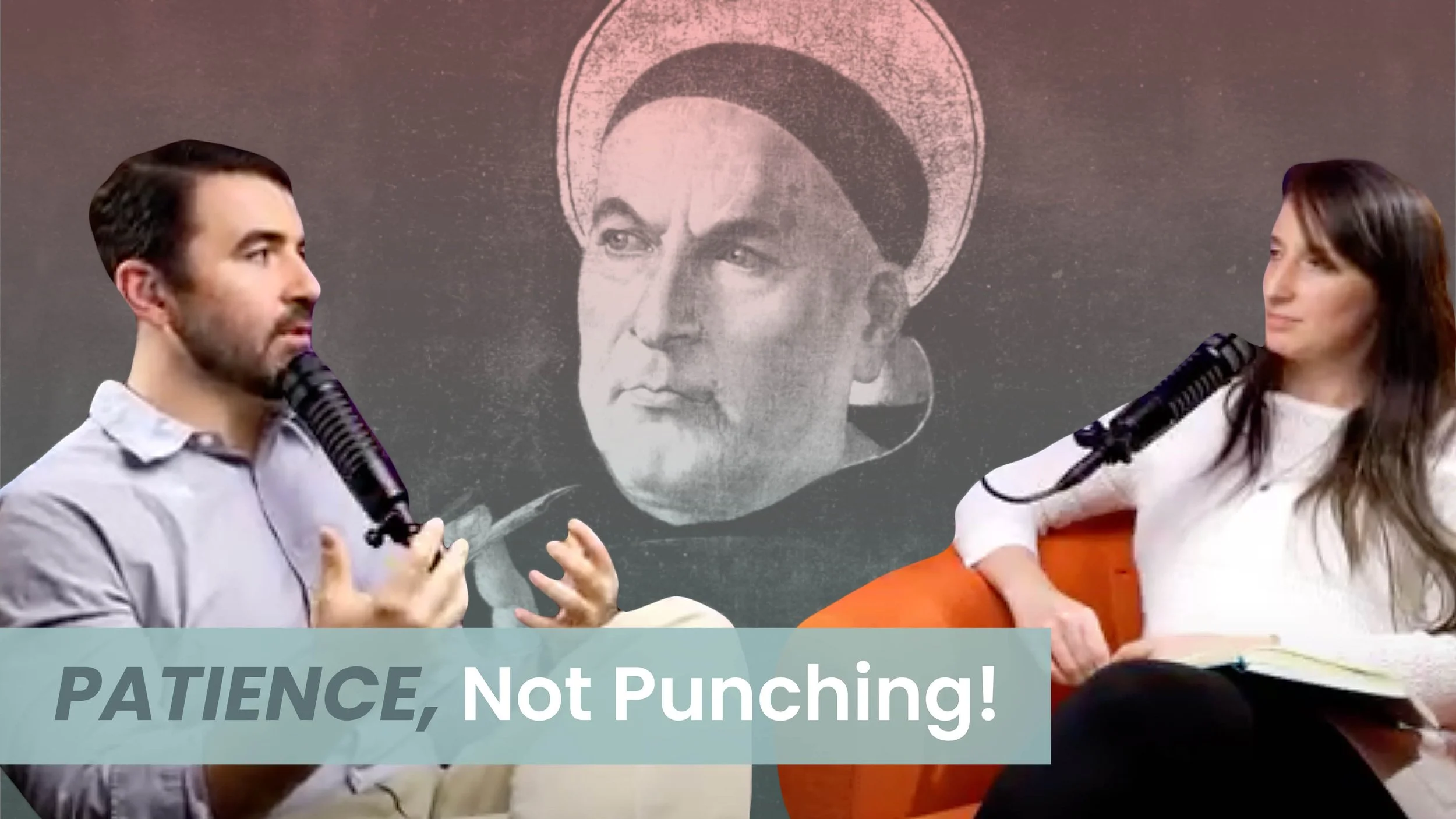6. Serenity Now: The Hardest Virtue is Patience
VIDEO VERSION
Audio Version
Episode Description
How do you find lasting serenity in your life? St. Thomas Aquinas says, “Through patience, man possesses his soul.” But why is patience such a hard virtue to cultivate? JonMarc and Teresa discuss the Virtue of Patience; not a white-knuckled avoidance of lashing out, but true serenity of mind and soul.
Episode Sponsor
Sponsor Information
Rob Hohler with Key Realty
Looking for a NEW HOME in Northwest OH? Check out his website and listings: https://robhohler.ikeyrealty.com
Show Notes
Books
The Mindful Catholic by Dr. Gregory Bottaro https://amzn.to/32GmygO
The Examen Prayer: Ignatian Wisdom for Our Lives Today by Timothy M. Gallagher https://amzn.to/3kqXyjF
Practicals for remaining patient:
1) When reviewing situation that got/is getting out of hand ask “What am I really afraid of?” “What scenario in the past or fear in the future am I worried about? What is actually present to me in the moment? What is my reality at this moment?”
2) Just stare. Hold off your reaction for 5-10 seconds. What’s the reality of the situation? And based on that reality, how should I respond.
3) Nightly Examen. Take a moment every evening to look back through your day. Where did you lose your peace? St. Ignatius of Loyola has an excellent formula for reviewing the day. You can purchase the book: https://amzn.to/3kqXyjF or you can learn more for free with this YouTube playlist (https://www.youtube.com/watch?v=qD1Bs6l-agw&list=PLqueiEKHoJed00griUP_Bw-jDzT_oVKFj)
4) Eat the frog! Pick the task you know you’re dreading and do it first (or when you are at the peak of your game).
5) Dr. Greg Bottaro’s 8-week virtual retreat: catholicpsych.com/store
Matthew 6:25-34: “Therefore I tell you, do not worry about your life, what you will eat [or drink], or about your body, what you will wear. Is not life more than food and the body more than clothing? Look at the birds in the sky; they do not sow or reap, they gather nothing into barns, yet your heavenly Father feeds them. Are not you more important than they? Can any of you by worrying add a single moment to your life-span? Why are you anxious about clothes? Learn from the way the wild flowers grow. They do not work or spin. But I tell you that not even Solomon in all his splendor was clothed like one of them. If God so clothes the grass of the field, which grows today and is thrown into the oven tomorrow, will he not much more provide for you, O you of little faith? So do not worry and say, ‘What are we to eat?’ or ‘What are we to drink?’ or ‘What are we to wear?’ All these things the pagans seek. Your heavenly Father knows that you need them all. But seek first the kingdom [of God] and his righteousness, and all these things will be given you besides. Do not worry about tomorrow; tomorrow will take care of itself. Sufficient for a day is its own evil.’
Josef Pieper quote on Patience: “Patience (in sharp contrast to the ideas of classical theology) has come to mean an indiscriminate, self-immolating, crabbed, joyless, and spineless submission to whatever evil is met with or, worse, deliberately sought out. Patience, however, is something quite other than the indiscriminate acceptance of any and every evil: ‘The patient man is not the one who does not flee from evil, but the one who does not allow himself to be made inordinately sorrowful thereby.’ To be patient means to preserve cheerfulness and serenity of mind in spite of injuries that result from the realization of the good. Patience does not imply the exclusion of energetic, forceful activity, but simply, explicitly and solely the exclusion of sadness and confusion of heart. Patience keeps man from the danger that his spirit may be broken by grief and lose its greatness. Patience, therefore, is not the tear-veiled mirror of a “broken” life (as one might easily assume in the face of what is frequently presented and praised under this name), but the radiant embodiment of ultimate integrity. In the words of Hildegard of Bingen, patience is “the pillar which nothing can soften.” And St. Thomas Aquinas, following Holy Scripture (Luke 21, 19), summarizes with superb precision: ‘Through patience man possesses his soul.’.” (The Four Cardinal Virtues)
Our Lady of Guadalupe as she appeared to St. Juan Diego: “Hear me and understand well, my little son, that nothing should frighten or grieve you. Let not your heart be disturbed. Do not fear that sickness, nor any other sickness or anguish. Am I not here, who is your Mother? Are you not under my protection? Am I not your health? Are you not happily within my fold? What else do you wish? Do not grieve nor be disturbed by anything. Do not be afflicted by the illness of your uncle, who will not die now of it.”
Awaken Catholic swag: awakencatholic.org/shop
Physically Spiritual episode with Dr. Greg Bottaro: awakencatholic.org/physically-spiritual/integration-and-holiness-with-dr-greg-bottaro

